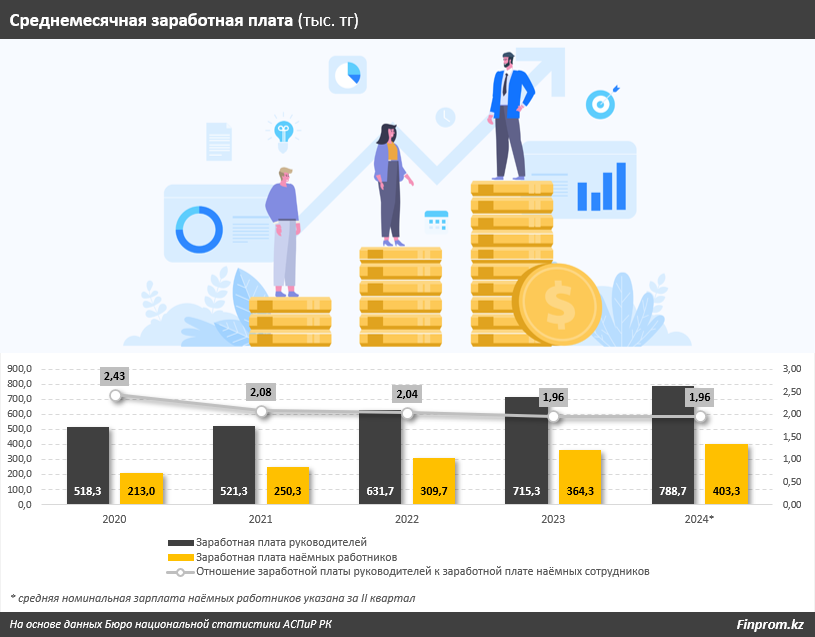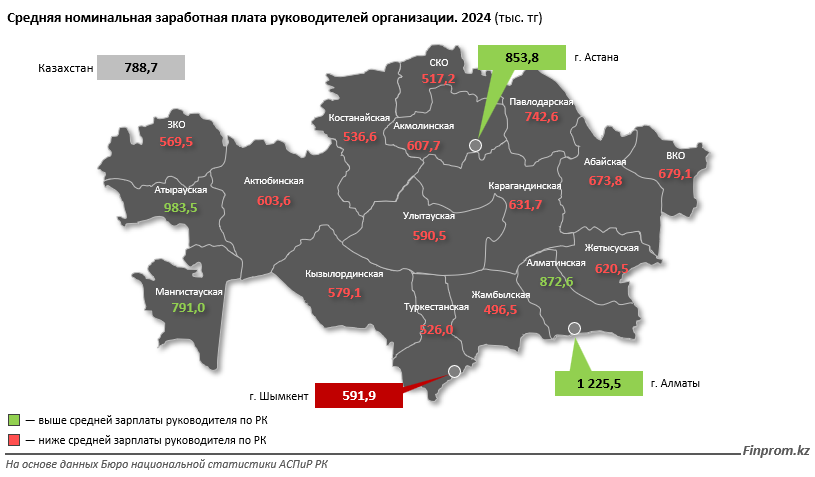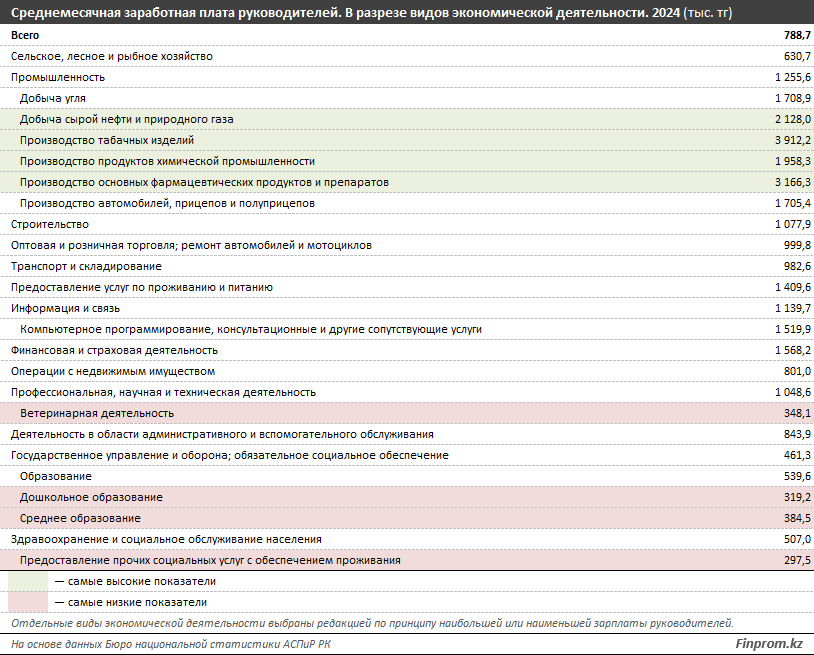The average nominal salary of an organization leader in Kazakhstan this year reached 788.7 thousand tenge, which is 10.3% higher than in 2023 and 52.2% more than four years ago in 2020. This data comes from the National Statistics Bureau (NSB) of the Agency for Strategic Planning and Reforms of Kazakhstan, as reported by inbusiness.kz citing Finprom.kz.
When comparing this figure to the average nominal salary across the economy, it is notable that they differ almost twofold. To be precise, the ratio of the salary of heads to the national average this year is 1.96. Interestingly, in 2020, this gap was even more pronounced, at 2.43 times. Since then, the disparity has been gradually decreasing.

Detailed reports from the NSB indicate that not all leaders in every industry and region can boast a salary of 788.7 thousand tenge. Rather, this amount reflects an average between the very high salaries of top managers at national companies and corporations and the relatively modest earnings of leaders of medium and small enterprises. For example, in Kazakhstan, there are branch managers earning 14.3 million tenge monthly, company directors making 10 million tenge, and heads of social services centers with salaries of 364.2 thousand tenge.
Pay attention to the map. Salaries exceeding 788.7 thousand tenge are observed among leaders only in five of the largest or rapidly developing regions of Kazakhstan. The highest salaries are earned by managers in Almaty, exceeding 1.2 million tenge. Oil executives earn less than a million: in Atyrau region, the figure is 983.5 thousand tenge, and in Mangistau, it is 791 thousand tenge. The heads of companies in Astana also serve as benchmarks, each earning 853.8 thousand tenge monthly.
In contrast, salaries for organizational leaders in Zhambyl (496.5 thousand tenge), North Kazakhstan (517.2 thousand tenge), and Turkestan (526 thousand tenge) regions appear significantly lower. Leaders in Shymkent, as well as in Ulytau, Kyzylorda, Kostanay, and West Kazakhstan regions, earn up to 600 thousand tenge.

Income distribution by economic sectors also shows significant variation among leaders. The highest salaries among bosses are held by directors of tobacco factories (3.9 million tenge) and pharmaceutical companies (3.2 million tenge). The oil sector ranks third in salary size for its heads, at 2.1 million tenge. Directors of automobile plants (1.7 million tenge) and coal mining companies (1.7 million tenge), as well as heads of banks and insurance companies (1.6 million tenge), and managers in IT organizations (1.5 million tenge) earn twice the average.
The lowest salaries compared to other leaders are found among those managing various social organizations (297.5 thousand tenge), kindergarten heads (319.2 thousand tenge), and chief veterinarians (348.1 thousand tenge). Moreover, in various budget organizations, salaries for department heads are also far from the average figure. School directors earn 384.5 thousand tenge, hospital chief doctors earn 507 thousand tenge, and heads of state institutions earn 461.3 thousand tenge.

The highest salary among officials is held by the Prime Minister and their deputies, each receiving 2.5 million tenge per month. Regional akims earn an average of 1.7 million tenge, ministers receive 1.5 million tenge, Majilis deputies earn 1.3 million tenge, and Senate members earn 1.1 million tenge. This is official information published by the NSB and is publicly accessible.
According to statistical reports, Kazakhstan has many different professions that can yield incomes even higher than those of leaders, notes Finprom. The main requirement is to become the best in your field, possess deep knowledge and experience, and produce unique products and services. For example, several such specialists were selected from three sectors of the economy: mining, construction, and information and communication.
Each sector has its own characteristics. For instance, in construction, salaries for top-level engineers responsible for construction work and safety (1.8 million tenge), technical supervision (up to 3.7 million tenge), and safety engineering (1.2 million tenge) exceed those of company leaders. In the mining industry, highly qualified specialists in engineering (up to 8.6 million tenge) and technological support (up to 4.2 million tenge) also rank among the highest earners.
Interesting results were obtained when forming such a list in the information and communication sector, where the average salary of a leader is 1.1 million tenge. As noted by Finprom, when studying the reports, the list of IT professions whose holders earn more than this amount was so long that only the most interesting and even extraordinary professions could be selected.
Skilled programmers, IT architects, and frontend developers earn over 1 million tenge. In addition, business analysts (up to 1.4 million tenge), animators (up to 1.8 million tenge), and computer graphics artists (up to 1.4 million tenge) also enjoy high salaries in this field. A unique profession in the industry with the most impressive salary is that of an engineering psychologist. This expert, who knows how to make technical systems work better and generate more revenue for the company, earns 15.3 million tenge—35 times the average salary in the country.